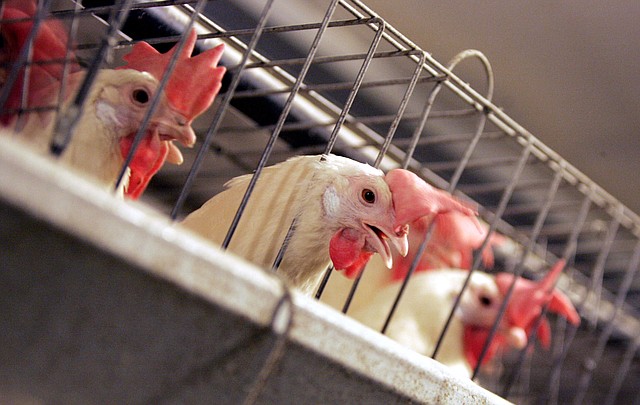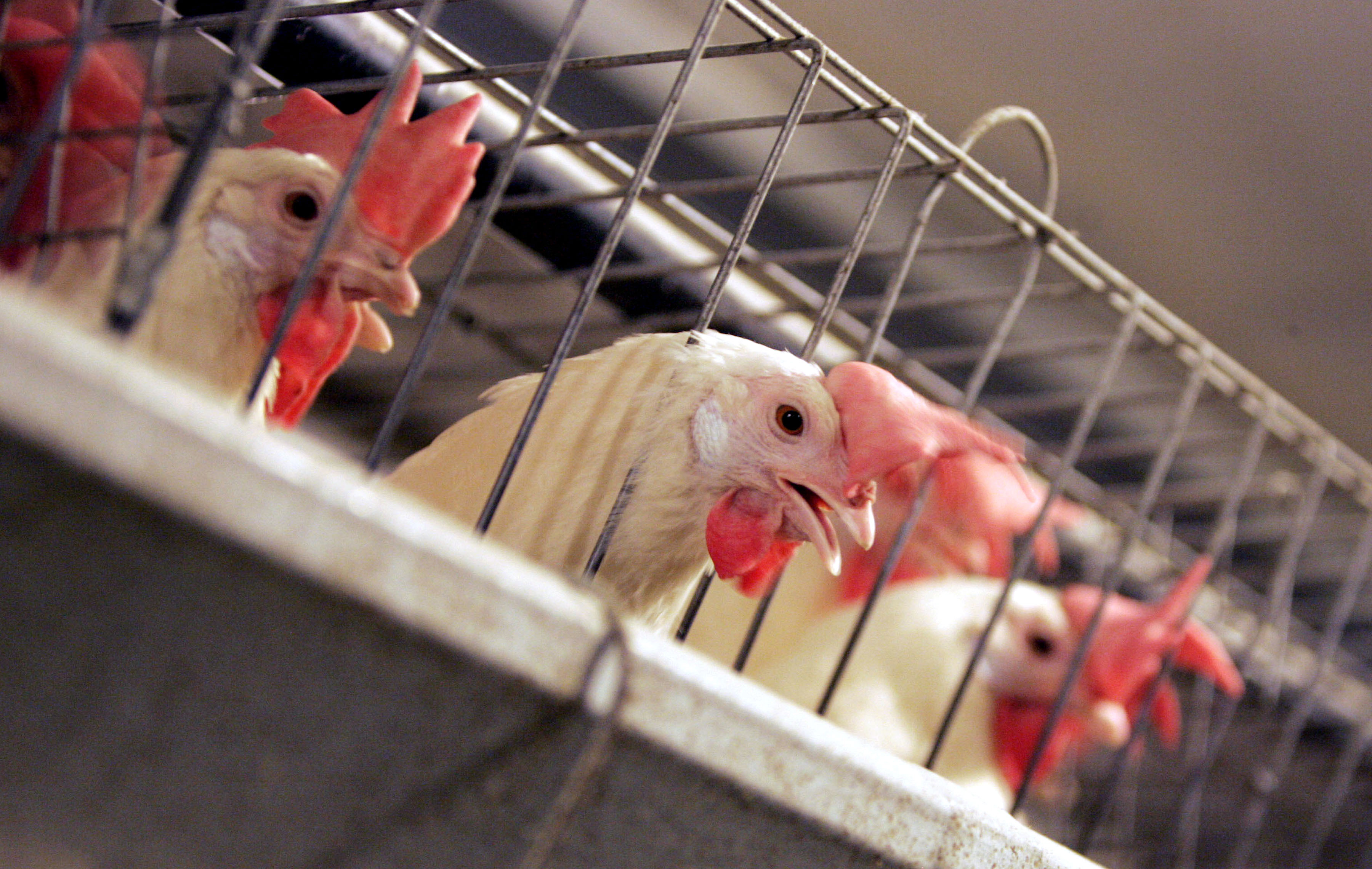Greater Chattanooga area chicken farmers feeling propane pinch
Thursday, January 30, 2014
A deepening propane shortage and slippery roads tripped up the region's poultry producers Tuesday and Wednesday, but Chattanooga's chicken plants expect to be back to normal operations today.
Koch Foods, which employs 600 people in Chattanooga, cancelled the plant's third shift Tuesday and first shift Wednesday. Pilgrim's Pride, which employs 1,500 local workers, maintained normal operations at its deboning plant on Market Street but cancelled the first and second shifts at its processing plant on Broad Street Wednesday.
Both plants expected to be back to normal today. The one-day delay was echoed across Georgia, Alabama and the Carolinas -- some of the nation's top chicken-producing states, said Tom Super, vice president of communications at the National Chicken Council. Georgia produces 23 million chickens a week, Alabama produces 21 million and Tennessee produces about 4 million weekly.
"I'm hearing some plants in Georgia have stopped catching chickens, transporting and processing, at least for the day," Super said. "Many [plants] will process on Saturday to catch up."
In North Alabama, some processing plants coudn't get trucks out to farms to pick up mature chickens, said Ray Hilburn, associate director of the Alabama Poultry and Egg Association. And some hatcheries with newborn chicks were forced to wait a day to deliver them to the farm.
But the biggest problem is propane.
"One of the major suppliers of propane gas -- to about 30 or 40 percent of our poultry growers -- as of last Thursday said they would not deliver to any of our poultry farms," Hilburn said. "I had several growers that ran out of propane last night. We had a gas truck try to go out this morning and it ended up in a ditch."
Chicken farmers use propane to heat chicken houses, which typically must maintain temperatures between 60 around 90 degrees, depending on the age of the chickens. Stanley Usery, a chicken farmer near Elkmont, Ala., grows 180,000 chickens in nine houses, and uses about 1,200 gallons of propane for each house, per flock.
"Our normal supplier could not bring us gas, but Tyson was able to ship some gas in here," he said. "So we're good to go right now."
He's keeping his 14-day-old chickens at 82 degrees in his houses, which is ideal for their growth. But even if the temperatures in chicken houses drop as low as 40 degrees, the chickens will still survive.
"Once chickens get at least two weeks old, they can pretty well survive," Hilburn said. "It's perfect conditions in the houses all the time, but that's not to say they will die if they're not under those conditions. Chickens are no different from humans. We like to keep our houses at 65 degrees, but we don't die if it gets colder."
Super said he had not heard of any chicken deaths caused by this week's weather. And, as the chicken industry heads into a busy Super Bowl weekend, he doesn't expect the transportation or propane problems to have any impact on grocery store shelves or the price of chicken.
"With warmer weather expected soon, plants catching up with production on Saturday and cold storage inventory, I don't think this will have an impact at the consumer level," he said.
And Hilburn said he's just glad chicken farmers and processors are staying safe as they work through the weather.
"Human life comes before chickens," he said.
PROPANE PRICES HIT NEW HIGH
Residential consumers of propane have received priority for fill-ups throughout the month, but even they are going to feel propane woes now that the fuel costs more for Americans than it has at any point in the last 20 years, according to the U.S Energy Information Administration.
The new national average price for residents for a gallon of propane -- which is used by 14 million American families, the National Propane Gas Association says -- is $4.17, nearly 20 cents more than its price at the end of December.
Last year, propane peaked at an average $4.15 in February.
On top of the natural price inflation due to increased demand, Tennessee state officials say some propane distributors are trying to use the cold weather as a gravy train, charging consumers excessive prices for the fuel.
"While we manage disruptions in propane delivery, we want to ensure that home and business owners are not subject to unfair price increases on the resources they need to keep warm," Tennessee Attorney General Bob Cooper said in a statement.
The agency said Wednesday that two complaints of price gouging have been filed, but neither were in the Chattanooga area.
Since a bitter cold snap sent temperatures around the country into the teens and below earlier in January, the propane industry has been trying to catch up with customers. Persistent bad weather, like Tuesday's snowfall across the South, has contributed to delivery problems.
But most propane-heated homes in the area have not gone without.
"The supply has been there," said Bledsoe County Mayor Bobby Collier. "I haven't heard of anyone having any problem."
Because of its geography, Bledsoe County has "a large amount" of propane customers, said Collier.
"In the mountains, it's bottled gas and propane," he said.
With thermostats turned up and propane supplies being funneled to the Mid-West and Northeast, delivery drivers are keeping the roads busy trying to service areas like Bledsoe.
To ease propane suppliers' pains, as many as 30 states have waived federal driving restrictions, which disallow one driver transporting hazardous materials for than 11 hours at a time, more than 70 hours a week and without a 10-hour break between driving shifts.
Last week, Gov. Bill Haslam of Tennessee, and Gov. Robert Bently of Alabama, each declared a state of emergency in their respective states to counter the threat of propane shortages and free up delivery drivers. This week, state officials said those exemptions will be in effect until the state of emergency is lifted.
Currently, Tennessee Department of Environment and Conservation officials say they aren't aware of any Tennessee residential propane users going without fuel, even with the latest addition of icy roads following snow.
"We have not received any reports of [Tuesday's] weather causing any difficulties with propane deliveries," said Kelly Brockman, TDEC spokeswoman, on Wednesday.
"TDEC is continuing to work with other state agencies and industry partners to ensure a steady supply of propane to customers throughout Tennessee," she said.
The hope for local officials and propane industry leaders is that temperatures will take a mild turn sooner rather than later, which would allow propane users some relief in need and cost. But Collier said outlying customers are prepared either way.
"A lot of times because of our remoteness and because we are rurual, people -- even more so than in a mero area -- they make arrangements," he said. "If you've lived in the rural counties for a time, you learn to adjust and prepare for that. We realize the importance of having a backup."
Contact staff writer Shelly Bradbury at 423-757-6525 or sbradbury@timesfreepress.com and staff writer Alex Green at 423-757-6480 or agreen@timesfreepress.com.

